Introduction
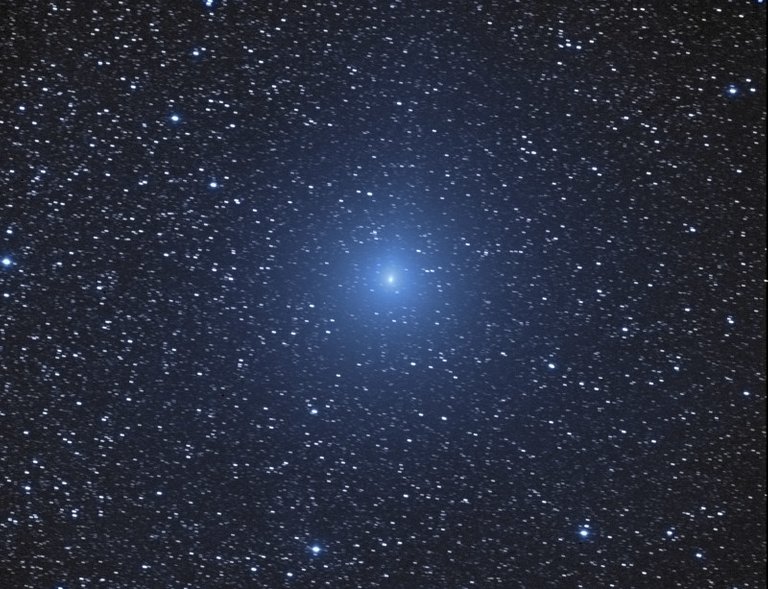
A comet similiar to Wirtanen - Comet 252P/LINEAR - passed close by earth in 2016. The author obtained this photo on April 5, 2016, when it was 15,000,000 km from earth. Image Credit: Author
In December this year, a comet called 46P/Wirtanen makes a relatively close approach to earth giving us an excellent opportunity to study a comet at close range. At its nearest point on December 16, the comet will be under 0.08 AU (Astronomical Units) from the Earth. An Astronomical Unit equals the mean distance between the earth and sun or a 150 million km. For comparison, the closest planet Venus, can never closer than 0.26 AU from earth so that Comet Wirtanen will be over 3 times closer than that in December.
Comet Wirtanen was initially the target for ESA’s Rosetta mission, but this had to be changed because of delays in the launch window meant this was no longer a viable target. Instead, Comet 67P/Churyumov–Gerasimenko became the new target. Even so, the comet is getting considerable focus from both professional and amateur astronomers alike who plan to observe to comet during its December approach.
For casual skywatchers the comet should become bright enough to be seen in binoculars, provided you are located in a dark sky. An ordinary camera mounted on a tripod should also capture it. More about this at the end of the article.
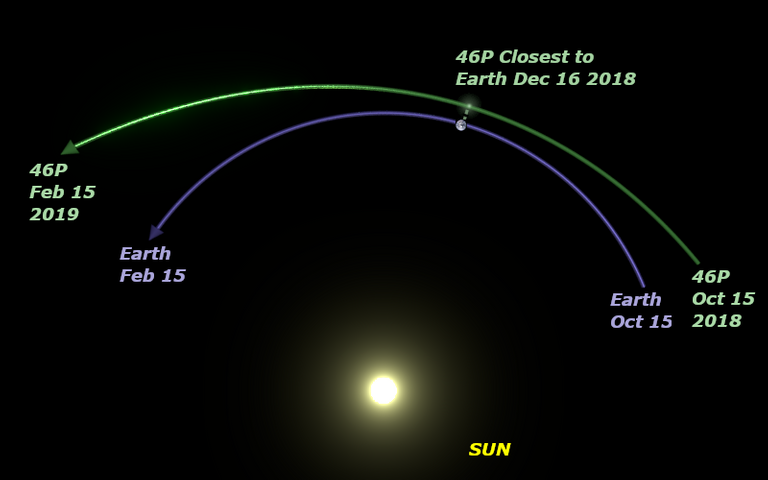
Comet Wirtanen's motion over the next 4 months is shown relative to the earth and sun. The gap between the comet and earth will continue to reduce until December 16, 2018. Relative sizes of the orbit's shown to scale, but comet, sun and earth size have been exaggerated. Credit: Author.
Behind the Name
Comet 46P/Wirtanen was discovered at Lick Observatory (California) astronomer Carl A. Wirtanen who found the comet on January 17, 1948, as part of the Shane-Wirtanen Galaxy survey. The Galaxy survey was intended to characterize the distribution of galaxies across the sky. The survey required taking over 1200 detail images of the sky on large photographic plates and then examining them manually. A byproduct of this survey was the discovery of some comet’s and asteroids, of with Comet 46P/Wirtanen was one.
Carl Wirtanen found 4 other comets in addition to 46P, although all them remained faint and distant. 46P/Wirtanen’s name is a combination of a designation and the discover’s name. The designation 46P means it is the 46th Periodic comet that has been seen on at least 2 returns. It is entirely reasonable to abbreviate Comet 46P/Wirtanen to “46P” or “Wirtanen.”
Jupiter Family of Comets
Comet Wirtanen is interesting because it belongs to a unique group of comet’s that are being influenced by Jupiter's gravitational field. Comet's that belong to this group are called the Jupiter Family of Comets. The effect of Jupiter on the orbit of Comet Wirtanen is evident in the following diagram where the comet's path between the years 1950-2250 is shown. Note that Earth and Jupiter show very stable orbits but the comet's orbit has changed dramatically numerous times (the blue line in the following diagram).
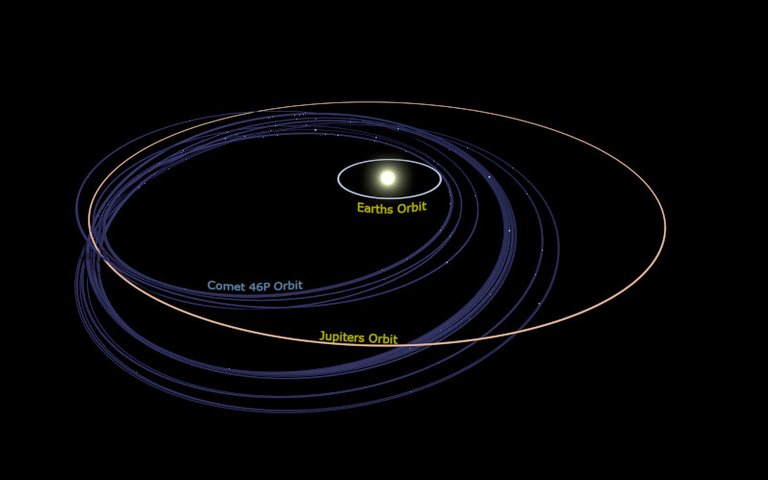
Orbital evolution of Comet 46P/Wirtanen, 1950-2150, showing it's chaotic orbit. Data Credit: JPL/Horizons. Rendering Credit: Author
Typically, Jupiter family comets have orbits that are a low inclination to the plane of the solar system and complete a full lap around the sun in 5-20 years. These comets are interesting targets for space missions since their positions can be predicted decades in advance and the amount of energy required to get to them is minimal. In the case of 46P/Wirtanen, it completes an orbit every 5.5 years and when nearest the sun, and can approach close to the earth.
Speaking of Jupiter's gravitation influence on other bodies in the solar system it is interesting to see this great animation showing the concentration of minor planets (asteroids and comets) in a band between Mars and Jupiter. Most of the minor planets shown here are asteroids, with only a handful of them being Jupiter family comets. However, many of the shown asteroids may have once been Jupiter family comets but have stopped outgassing.

Image credit: NASA/JPL-Caltech
Radar Observations of the Comet Nucleus
When Comet Wirtanen is closest to us in mid-December, features as small as 5km across will be resolvable optically. However, this is not quite good enough to resolve the comet's nucleus which is believed to be just 1.2 km across (give or take). However, radar observations should do better and may be able to detect the size and shape of the nucleus.
Some investigators have already used radar to generate terrain maps of near-earth asteroids and comets in the past. The key is selecting an object that has both a largish cross-section and is near the earth, as happens with 46P in December.
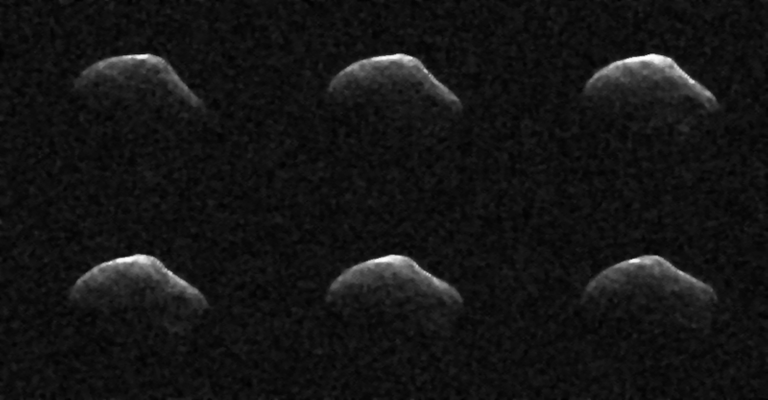
On March 22, 2016, the nucleus of Comet P/2016 BA14 was radar imaged using Goldstone Radar system in California. This comet was interesting in that it showed virtually no volatile activity and was problably a borderline asteroid/comet. Comet Wirtanen's nucleus is about the same size as this, but it will be further way. Credit: NASA/JPL-Caltech/GSSR
What to Expect
Anyone with access to dark skies and an ordinary set of binoculars should be able to find the comet in the first half of December when it is brightest. However, there is no guarantee of success since Comet Wirtanen will look like a relatively inconspicious small cloudy spot in the sky. Being a small comet that is relatively distant from the sun means that it will lack the "classic" tailed comet appearance. Still, many people may want to add a comet to their bucket list!
To assist in finding Comet Wirtanen, please refer to the finder chart below which is shown in the correct orientation for people located in the northern hemisphere at about 9 pm. When using the chart face roughly south, and see if you can identify the Pleiades (M45) which is a famous rather bright cluster of stars shown at the top of the finder chart. The Pleiades are prominent even with the naked eye and are a good starting point for finding the comet. Once the Pleiades are found, train your binoculars on it, and then scan down-and-to-the-left (i.e., Southeast) with the binoculars and see if you can find the comet. Remember you are a looking for a small cloudy spot. In the southern hemisphere, turn the chart upside and face north-east in the evening.
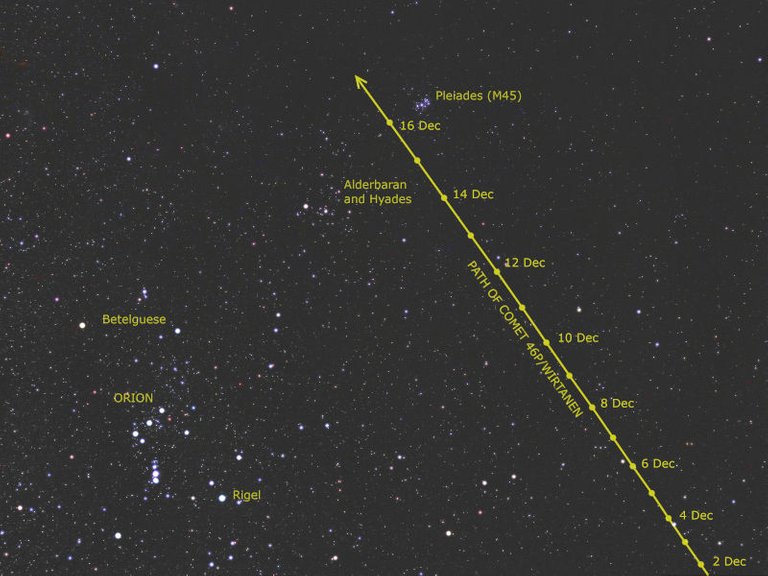
This is similiar to the naked eye view in the first half of December looking south east from mid-northern latitudes. The path of the comet is as shown, along with some well know objects and the prominent constellation of Orion. On December 14-16, Comet Wirtanen will appear close to the famous Pleiades Star cluster. Please click for a larger version. Image Credit:Author.
The best opportunity to see the comet probably comes around Dec 14/15, before the moon starts to seriously brighten the sky. It is also almost in the same binocular view as the Pleiades at this time, making it easier to find.
Catching Comet Wirtanen on Camera
You might not succeed with seeing the comet by eye. If so don't despair, you might want to try it photographically. I suspect a fast wide angle lens (24mm for example) should show the comet on a 15-second long exposure at ISO400 or faster. I made the following image on October 27. Admittedly, this was with a guided 10 minutes exposure (using an Olympus 75mm f1.8 lens at f2.8), but the comet should brighten a lot more from this over the next 6-7 weeks.
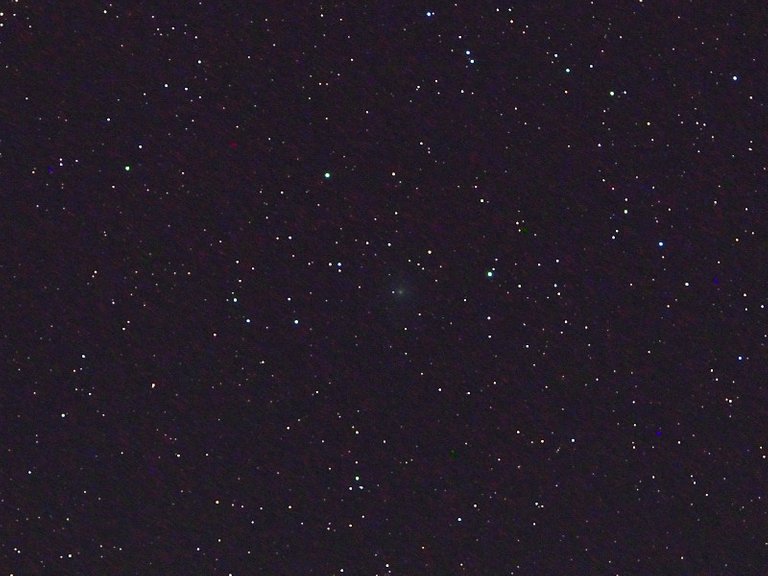
This image was made using an Olympus 75mm f1.8 lens set to f2.8 on October 27. Comet 46P/Wirtanen is the small diffuse smudge at the center (you may also note it has a green color). It should become larger and brighter over the coming weeks. Image Credit: Author
Closing Remarks
Comet 46P/Wirtanen's approach to the earth in December 2018, will not only be of interest to professional astronomers but is a great opportunity for casual skywatchers to see a comet (but don't expect too much!).
References
- Brandt, John C., and Robert DeWitt. Chapman. Introduction to Comets – Second Edition. Cambridge: University Press, 2009.
- Center for NEO Studies. https://cneos.jpl.nasa.gov/
- Comet 46P/Wirtanen Observing Campaign. http://wirtanen.astro.umd.edu/
- Goldstone Asteroid Schedule (Radar Observations). https://echo.jpl.nasa.gov/asteroids/goldstone_asteroid_schedule.html
- Klemola, Arnold Richard (September 1991). "Obituary: Carl Alvar Wirtanen, 1910-1990". Bulletin of the American Astronomical Society. 23: 1495–1496
- Ulamec, S.; Espinasse, S.; Feuerbacher, B.; Hilchenbach, M.; Moura, D.; et al. (April 2006). "Rosetta Lander—Philae: Implications of an alternative mission". Acta Astronautica. 58 (8): 435–441.

SteemSTEM is a community project with the goal to promote and support Science, Technology, Engineering and Mathematics on the Steem blockchain. Please come over and check out the new steemstem application at https://www.steemstem.io/
If you wish to support the steemSTEM project you can:
Contribute STEM content using the #steemstem tag | Support steemstem authors | Join our curation trail | Visit our Discord community | Delegate SP to steemstem
Great read Terry 😊
I hope to have a clear sky in middle of December, so that I could get some shots of Comet Wirtanen.
Thanks, Kevin, fingers crossed for clear skies! There is also some suggestion that there might some interesting dust-tail features caused by favorable viewing geometry in December, however, I am not sure the comet produces enough dust for this to eventuate.
Thank you Terry :-)
I am very curious about his appearance. But also if I can do it. That would be the first attempt with Goto tracking on a comet. I should be able to get the coordinates from planetarium software. However, I don't know where I can get the speed to the tracking rate. Do you have a tip for me?
Hi Kevin, try JPL Horizons which can output RA and Dec rates for you. But to save you time I ran it for December and here are the rates in arc sec per hour.
Thank you so much Terry :-)
I will also try to use the website. Thanks a lot for the table, it will save me a lot of mistakes and time :-)
Seconded. Would be lucky recognizing it though.. Not sure how they see the stars differently, they all look alike to me.
It takes a little bit of practice to get familiar with the constellations :) I did see the comet last night in my 8" reflecting telescope, but I "cheated" by entering the comet's coordinates into the telescopes mount and there it was!
This post has been voted on by the SteemSTEM curation team and voting trail in collaboration with @utopian-io and @curie.
If you appreciate the work we are doing then consider voting all three projects for witness by selecting stem.witness, utopian-io and curie!
For additional information please join us on the SteemSTEM discord and to get to know the rest of the community!
Hope for clear sky too. It will be worth seeing the comet. Thanks for the detailed information and guidance.
Wish I will be lucky to watch the great nature fenomenon on mid Desember this year. Thanks for very useful posting stuff @terrylovejoy.
Good luck, please post if you are successful.
great post
Congratulations @terrylovejoy! You have completed the following achievement on the Steem blockchain and have been rewarded with new badge(s) :
Click here to view your Board of Honor
If you no longer want to receive notifications, reply to this comment with the word
STOPDo not miss the last post from @steemitboard: